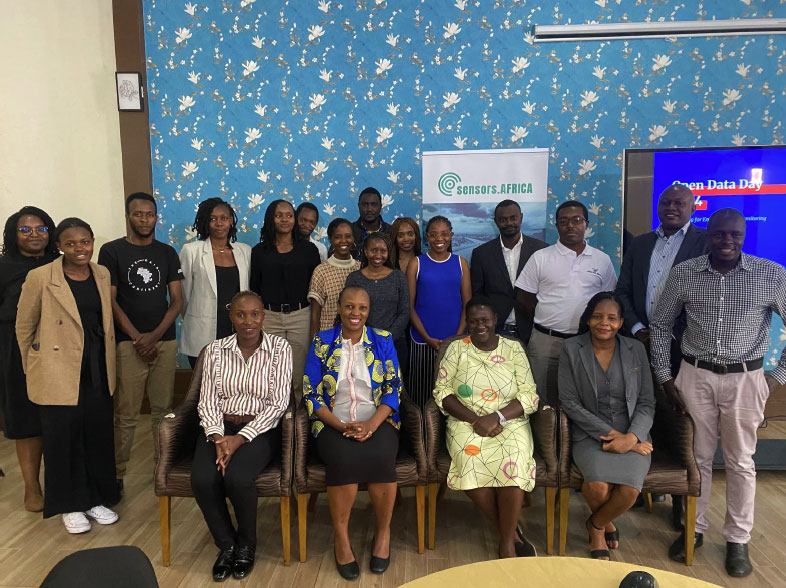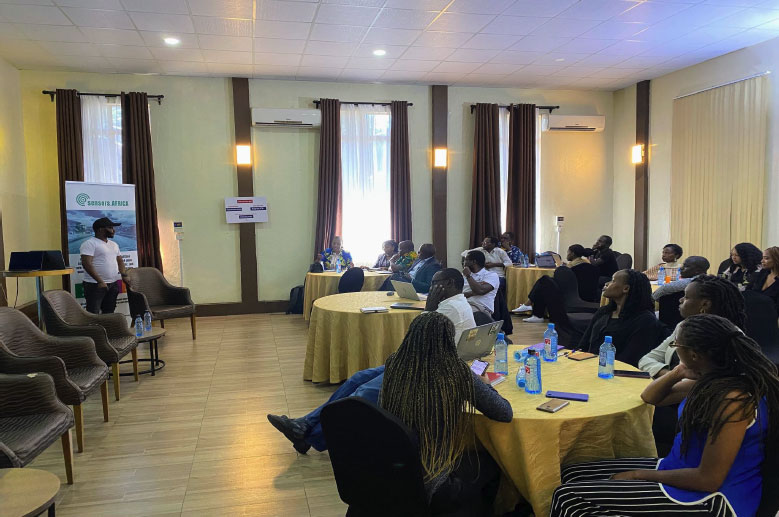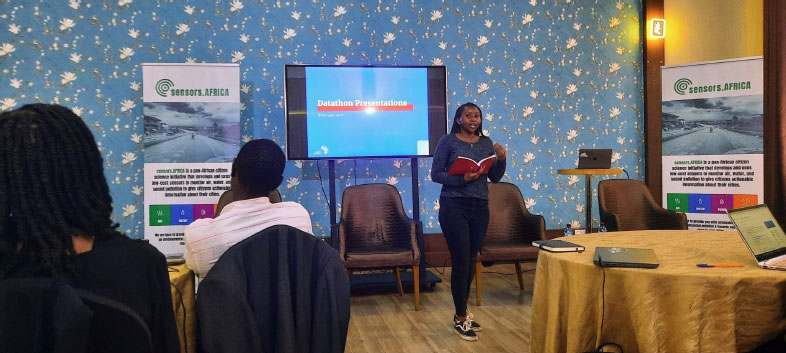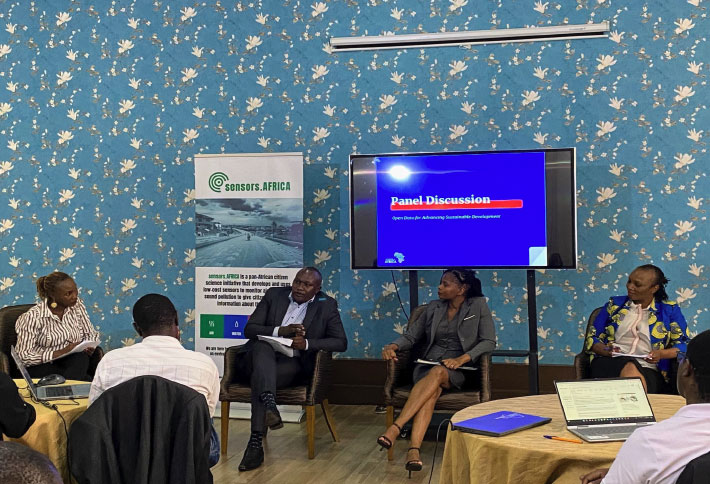Sub-Saharan Africa bears an immense burden of disease and premature deaths attributed to environmental pollution. Recent studies suggest that escalating pollution levels could undermine efforts to improve health and economic efforts across the continent and slow progress towards achieving sustainable development goals (SDGs). However, lack of sufficient and reliable data and research hinders the development of policies aimed at reducing environmental pollution.

This year Open Data Day, celebrated on 7 March, placed special emphasis on “Open Data for Advancing Sustainable Development Goals.” sensors.AFRICA celebrated the day by organising an event dubbed “Open Data for Environmental Monitoring.”
The event attracted participants from various fields, including data analysts, health practitioners, environmental and atmospheric scientists, urban planners, reporters, fact-checkers, software engineers, as well as undergraduate and graduate students. The primary objective was to bring together stakeholders committed to tackling environmental issues and promoting sustainable urban development. The event was also aimed at showcasing the advantages and potential of open data in environmental monitoring, and in advancing SDGs.
Underscoring the role of open data in promoting transparency, accountability, and innovation, Laura Mugeha, the community coordinator at sensors.AFRICA and africanDRONE, stressed the importance of data being findable, accessible, interoperable, and reusable that encompass the openness of data. “Open data should be as open as possible and as closed as necessary,” she added.
sensors.AFRICA, is a citizen science initiative by Code for Africa that locally develops and assembles low-cost sensors to give citizens and civic watchdogs actionable information about their cities. The initiative provides open-air quality data and has deployed sensors in different cities in sub-Saharan Africa, including in Accra, Abuja, Kumasi, Lagos and Nairobi.
“Our air quality datasets are utilised by a wide range of stakeholders, including journalists who report impactful stories on the detrimental effects of air pollution in marginalised communities,” said Alicia Olago, senior product manager at sensors.AFRICA.
She further emphasised the critical role of citizen science and participatory mapping in pinpointing pollution sources, noting: “The added sense of ownership by communities who participate in data collections often leads to informed decision-making and social change in African communities.”
Gideon Maina, the senior IoT engineer at sensors.AFRICA delved into the technical aspects, showcasing the hardware and software components, along with the design principles that guide the development of the low-cost sensors. “We want anyone with the skills and capacity to develop a sensor to use our design and build their own sensor.”
The sensors have been upgraded to include a solar panel to cope with power fluctuations, and feature a dashboard crucial for tracking deployment and maintenance schedules, OTA updates, device configurations, and mapping the sensor network.
The air quality Datathon: Use cases for open air quality data
The main event was the air quality datathon. Participants were asked to divide into groups of five, with each group nominating a leader, presenter, notetaker, timekeeper, and a researcher. Teams chose from Nairobi, Accra, and Abuja to develop a use case for the selected city’s dataset. With just an hour at their disposal, groups harnessed open air quality data from sensors.AFRICA to craft their innovative use cases.

Smart mobility solutions in Abuja
The Abuja group aimed to create smart mobility solutions. Using a predictive model, they sought to guide commuters towards the most convenient and eco-friendly transport options. Their analysis – which connected poor air quality directly to transportation choices – involved using sensors.AFRICA air quality datasets travel data from Abuja Metropolitan Authority, as well as demographic data from the Nigerian National Bureau of Statistics. The group envisioned providing air quality information to facilitate informed decisions.
Non-motorised transportation
Focussing on reducing emissions, the Accra team’s use case was centred around advocating for non-motorised transportation to minimise future health impacts on the students at the University of Ghana, where the sensor is located. Their concern arose from the university’s proximity to a major highway, hence the elevated air pollution levels. With particulate matter readings exceeding WHO standards, and health data from Ghana’s Ministry of Health showing rising cases of respiratory diseases such as asthma and pneumonia, the group advocated for legal reforms. Their goal: to leverage air quality data in supporting community-led initiatives for cleaner air.

The Nairobi group proposed transforming a waste disposal site in Mathare, an informal settlement, into a vibrant green space. The area suffers from poor air quality and high temperature levels from open waste burning, and deforestation. By correlating air quality and temperature data with environmental degradation indicators, the group aimed to use placemaking as a tool. Their goal was to foster community engagement in revitalising Mathare into a healthier, greneer neighbourhood.
Reflecting on the Datathon
The event concluded with a panel discussion, led by Alicia Olago, highlighting the need for inclusive dialogue on environmental monitoring, involving governments, NGOs, and media. Challenges with data analysis and constraints in data collection were also discussed. “One of the greatest challenges for environmental reporting is data analysis, interpretation and understanding science jargon.” Jackline Lidubwi, project coordinator, Internews Earth Journalism Network said. “We should not start at data and end at data,” Victor Indasi, Breathe Cities Lead, Kenya, Clean Air Fund.

Highlighting the benefits of open data, Maurice Kavai, Green Nairobi said “Open data has supported us in advocating for more resources from the legislative assembly for air quality interventions in Nairobi County.”On open data for sustainable development goals, Dr Andriannah Mbandi, Waste Lead for United Nations High Level Climate Champions said: “I always say atmospheric science is a creed; this event has provided me with a new audience to work with, one that resonates with the commitment to leave no-one behind”.
About Open Data Day
Open Data Day (ODD) is an annual celebration of open data all over the world. Groups from many countries create local events on the day where they will use open data in their communities.
As a way to increase the representation of different cultures, since 2023 we offer the opportunity for organisations to host an Open Data Day event on the best date within a one-week period. In 2024, a total of 287 events happened all over the world between March 2nd-8th, in 60+ countries using 15 different languages.
All outputs are open for everyone to use and re-use.
In 2024, Open Data Day was also a part of the HOT OpenSummit ’23-24 initiative, a creative programme of global event collaborations that leverages experience, passion and connection to drive strong networks and collective action across the humanitarian open mapping movement
For more information, you can reach out to the Open Knowledge Foundation team by emailing opendataday@okfn.org. You can also join the Open Data Day Google Group to ask for advice or share tips and get connected with others.








